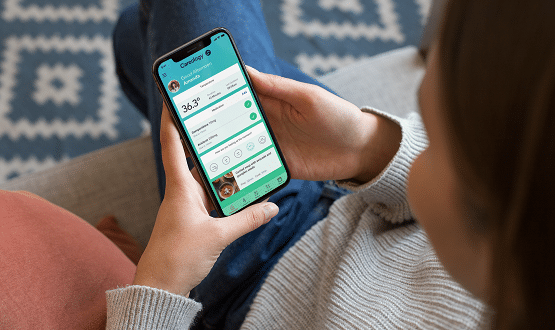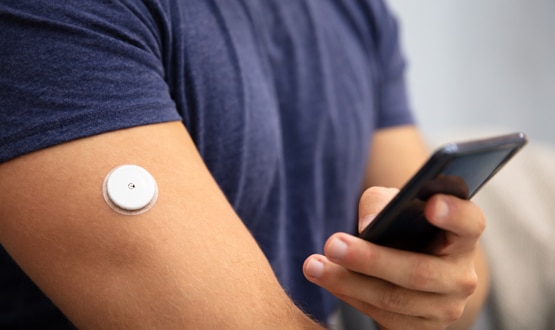Using wearables to transform cancer care – and better equip clinicians

The use of wearable technology in day-to-day life is growing, but in healthcare it’s still a relatively new concept. Careology founder Paul Landau is hoping to change that.
When Landau’s wife Lucy was diagnosed with Hodgkin’s lymphoma in 2015, the pair were overwhelmed with the amount of information they had to remember, and the vital signs to stay on top of.
Having worked in wearable technology for most of his career – he founded fitness tracking company Fitbug in 2004 – Landau saw a wealth of opportunity to use wearables to improve the experience of cancer patients.
In 2017 Careology was born, a digital cancer care platform that uses wearable technology to monitor cancer patients from the comfort of their own home, while keeping clinicians and nurses informed on their wellbeing.
“I watched Lucy go through her treatment having worked in wearable tech for so many years and I just saw so many opportunities along the way to better support somebody going through such a complex diagnosis,” Landau told Digital Health News.
“Really where I saw the opportunity was how we can better support people when they’re at home.
“They’re making judgement calls, which can sometimes be quite clinical judgement calls, by themselves and that’s where things can often go quite wrong.”
Deciding to take a consumer-based approach, Landau envisioned a platform that would better equip a person for being a cancer patient and also seamlessly connect them to a support network and their clinicians.
The first step in this process was using wearables to monitor temperatures – a vital task for any patient undergoing chemotherapy as a temperature spike could indicate sepsis.
“The initial idea was connecting a Bluetooth enabled temperature patch to an app that would alert the patient, potentially a family member or caregiver, and the clinical team at the hospital that this person’s temperature has spiked,” Landau said.
From there the company has grown into a platform for patients, caregivers and family, and clinicians.
Empowering patients
Patients are able to track their own vital signs as well as record how they are feeling in their daily diary, which uses red, orange and amber alerts to signify good and bad days. This becomes helpful in clinic appointments as healthcare professionals can see when a patient had a bad day and investigate what may have caused it.
It also helps them engage in their own care to help them feel empowered during a particularly dauting time, Landau explained.
Family and caregivers can also receive notifications if a patient, for example, has forgotten to take their medication. Or they can see when a patient isn’t feeling well and can check in to offer support.
Lastly, the professional’s platform allows clinicians to monitor patients more closely, with regular updates on a patient’s condition allowing them to work more proactively in their care.
“They key thing for me with wearables has always been how seamless they can be. What I mean by that is how we can help someone keep an eye on their vital signs or physiology without putting lots of burden on them,” Landau told Digital Health News.
“For me, the whole approached had to be a consumerised, holistic approach with really useful tools to better equip you, as a patient, going through your treatment.
“There is so much that you need to manage and measure when you get a cancer diagnoses and it’s a huge learning curve for people, so the more we can help them remotely the more we can help them feel safe.”
Careology recently partnered with RedArc, a provider of long-term support for people facing serious illness. RedArc nurses can now quickly view real-time health and wellbeing data, including a patient’s temperature, heart rate, mood, journal entries and activity levels.
Christine Husbands, managing director of RedArc, said: “Ensuring our nurses can offer the right digital tools gives breadth and depth of support, from initial diagnosis through treatment and beyond.
“This powerful combination will make such a difference to the physical and emotional wellbeing of the people we look after at this vulnerable time in their lives.”
Room to grow
Asked if the health sector is using wearables enough Landau answers “definitely not”.
“What Covid has done is let the genie out of the bottle to understand that appointments don’t have to be face-to-face and sometimes it’s far more convenient for clinicians and patients for them not to be,” he added.
Wearables and consumer-based technology can provide better insights into health conditions, such as the cumulative effects of cancer treatments over time, Landau explained.
This results in clinicians being equipped to make more informed decisions about health and care.
“One of the things this type of platform does is provide data that can show a specific moment in time, for example if someone’s temperature spikes. But also, and importantly, you can see how somebody is feeling, their weight, blood pressure or mood,” Landau said.
“You’re able to get a much more complete picture over the duration of someone’s treatment rather than just snapshots.”
A better understanding of how a patient is reacting to treatment, through the collection of this data, will ultimately lead to more personalised care.
An ‘out of the box’ solution
Careology is not yet prescribed in the NHS but the company is in talks with trusts to go live in the coming months.
Landau said the solution can be deployed “very quickly” as it’s a mobile and web-based platform.
Installation of Careology does not require any changes to already in place hospital systems, nor does it involve any hardware, so it can be installed “out of the box”, Landau added.



